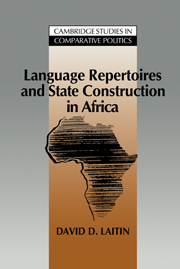Book contents
- Frontmatter
- Contents
- Preface
- PART I LANGUAGE REPERTOIRES AND THE STATE
- PART II SOCIOLOGICAL AND POLITICAL FORCES DESCRIBED
- 4 The micro dynamics of language use in contemporary Africa
- 5 Macro forces shaping the contemporary language situation in Africa
- PART III STRATEGIC THEORY APPLIED
- PART IV CONCLUSION AND POLICY RECOMMENDATIONS
- Notes
- References
- Index
5 - Macro forces shaping the contemporary language situation in Africa
Published online by Cambridge University Press: 03 May 2010
- Frontmatter
- Contents
- Preface
- PART I LANGUAGE REPERTOIRES AND THE STATE
- PART II SOCIOLOGICAL AND POLITICAL FORCES DESCRIBED
- 4 The micro dynamics of language use in contemporary Africa
- 5 Macro forces shaping the contemporary language situation in Africa
- PART III STRATEGIC THEORY APPLIED
- PART IV CONCLUSION AND POLICY RECOMMENDATIONS
- Notes
- References
- Index
Summary
Previous approaches to the study of nation building have been apolitical. Primordial theory assumes that people inherit their identities and learn, quasi-genetically, to love their mother tongue, even if their mother has never spoken it. Cybernetic theory assumes that people are merely recipients of messages, slaves to the communications network in which they are inextricably enmeshed. Strategic theory introduces politics. It assumes that individuals, organizations, and states all have preferences about language and use available resources to fashion the communications network that surrounds them. Those who successfully fashion that network, strategic theorists further assume, seek to develop legitimating ideologies about the favored language; its new speakers recreate their own pasts, turning the merely instrumental into something primordial. This phenomenon, described as the “invention of tradition” (Hobsbawm and Ranger, 1983), demonstrates that the primordial is not always given; sometimes it is taken.
The description of Africa's current language scene at the micro level, in Chapter 4, downplayed the larger historical forces that create incentives, infuse status, and punish laggards. It is the purpose of this chapter to paint the macrohistorical picture. While history is necessarily the confluence of many interests and actors, with outcomes altered by fortune, this chapter treats the historical actors in Africa serially, one by one. By separating the historical forces, for analytical purposes, we can better appreciate the variety of mixes that have come to constitute Africa's present. By paying attention to preferences and strategies, we will be better able to see what occurred by design and what was the result of fortune's hand.
- Type
- Chapter
- Information
- Language Repertoires and State Construction in Africa , pp. 82 - 100Publisher: Cambridge University PressPrint publication year: 1992

